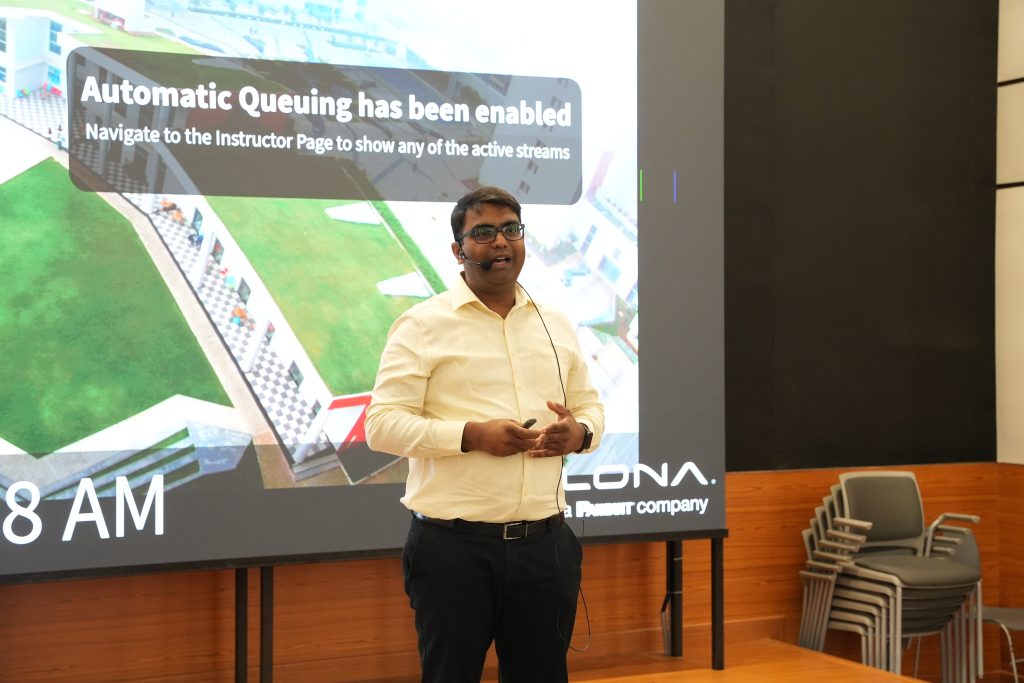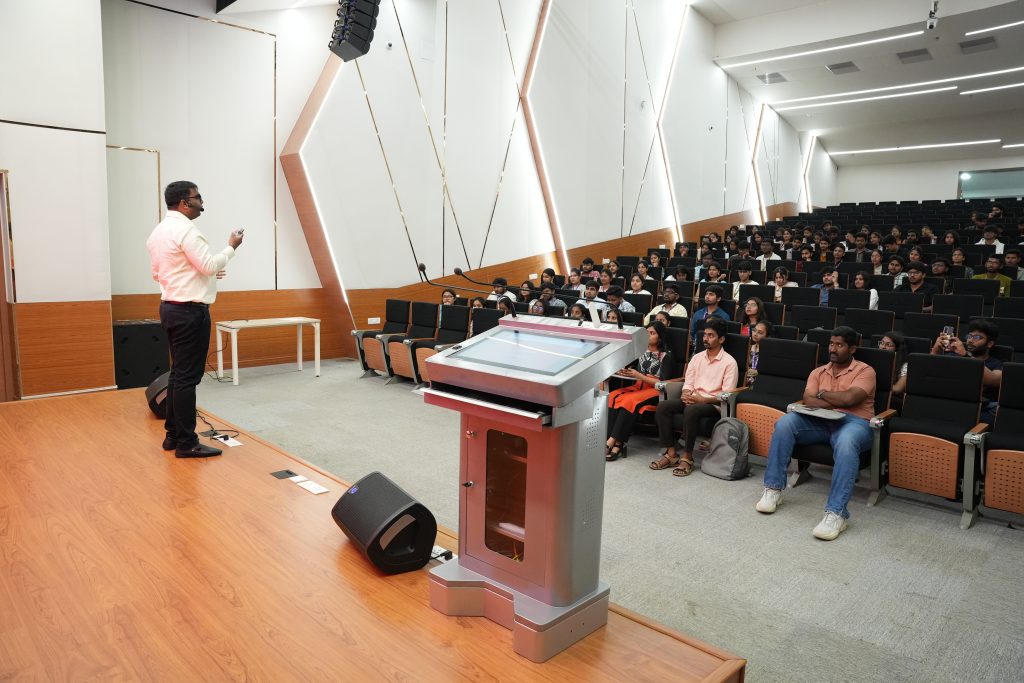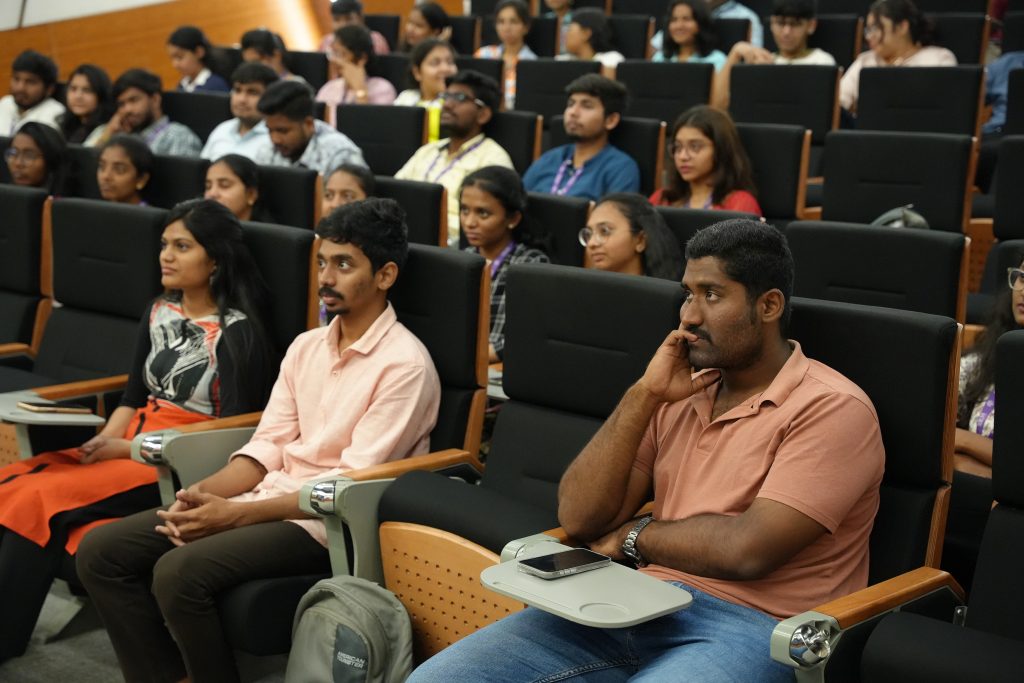- Guest Talk on an Overview of HR in Corporate March 6, 2025

The Department of Management organised a Guest Talk on “Business Communication; Overview of HR Department in a Corporate”. Mr Sannu Francis, General Manager of Orient Cement, delivered the session on the role of HR as a strategic partner, aligning talent management with overall business objectives.
Mr Francis remarked that the role of HR begins with manpower planning; determining the right number of employees, structuring budgets, and forecasting production needs based on market trends. HR is responsible for recruiting and onboarding the right talent through sourcing, competency-based interviews, and psychometric testing. Once onboard, HR focuses on developing employees through training and learning initiatives that enhance knowledge, skills, and attitudes. It manages performance by setting clear goals, conducting mid-year reviews, and overseeing annual appraisals, ensuring fairness and objectivity.
Additionally, he stated that HR administers compensation, benefits, and statutory payments while upholding compliance and legal standards. Beyond these functions, Mr Francis said that effective communication: verbal, nonverbal, written, and visual; is key to fostering strong relationships and engagement within the organization, making HR indispensable for driving business success.
The session gave a comprehensive overview of the significance of HR in a Corporate and the importance of business communication.
Continue reading → - Parameters to Measure a University Entrepreneurial Ecosystem February 28, 2025

With the increasing emphasis on startup culture and enhancing entrepreneurial ventures among the youth, Dr Aftab Alam, Assistant Professor from the Department of Management has published a paper “Developing a Reflective-formative-formative Scale for Measuring University Entrepreneurial Ecosystem from Students’ Viewpoints” in the Q1 journal IEEE Transactions on Engineering Management having an impact factor of 4.6.
Dr Aftab and his team have conducted research on how universities can create the best environment to support entrepreneurship among students and staff. The team has identified three key elements that help an entrepreneurial ecosystem thrive:
- Skill Development – Helping people learn how to start and manage businesses.
- Resources – Providing tools, funding, and guidance.
- Culture – Encouraging creativity, risk-taking, and innovation.
They have also created a way to measure how well universities are doing in building this supportive environment, helping them improve and compare with others.
Abstract
This research addresses the gap in the literature on University Entrepreneurial Ecosystems (UEE) by conceptualizing UEE as an ecology-inspired system with dimensions like Entrepreneurial Skill Development, Resources, and Culture. Unlike prior studies focusing on isolated aspects, we provide a comprehensive framework and develop robust measurement scales using a rigorous four-step methodology, ensuring nomological validity. The paper contributes to entrepreneurial ecosystem literature by offering a novel conceptualisation and practical tool for evaluating and comparing UEE performance. This study aids scholars in understanding UEE’s holistic impact and supports managers in enhancing university-driven entrepreneurship for regional development.
Practical Implication of the Research
This paper contributes to the entrepreneurial ecosystem literature by conceptualising and measuring performance of university entrepreneurial ecosystems (UEE). Beyond academic circles, it could also serve as a valuable tool for managers seeking to evaluate and enhance the performance of these ecosystems.
Collaboration
- Dr Arpita Ghatak, Kent Business School, University of Kent
- Dr Bhaskar Bhowmick, Indian Institute of Technology Kharagpur
- Dr Swagato Chatterjee, Queen Mary University of London
Future Research Plan
- Longitudinal Validation: Conduct longitudinal studies to evaluate how UEE dimensions evolve over time and their sustained impact on entrepreneurial outcomes like spinoffs, startups, and regional development.
- Comparative Analysis: Compare UEEs across diverse geographic, cultural, and institutional contexts to identify patterns, best practices, and challenges unique to different ecosystems.
- Entrepreneurial Outcomes Measurement: Develop advanced metrics to assess the direct and indirect outcomes of UEEs on entrepreneurial intentions, skill-building, and economic growth.

Confirmatory first-order measurement model results for the subscales
Continue reading →
Hierarchical Third-Order Measurement Model Results



